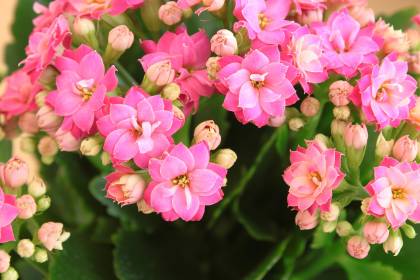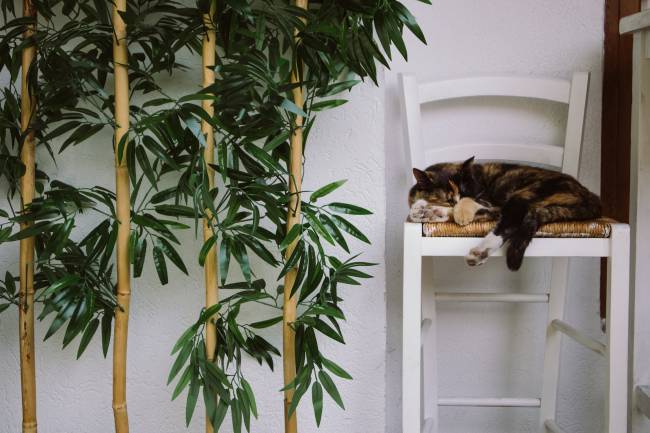
Connect with a verified veterinarian in minutes. Licensed vets are available 24/7 to answer your questions. No need to worry about your furry family member.
Having indoor and outdoor plants is often a joy for many pet parents. But sometimes we forget to consider that some of the plants we love may actually be poisonous to our cats.
One beautiful plant that many of us enjoy growing is the kalanchoe. They flower and look so beautiful! But are kalanchoes toxic to cats? What happens if a cat eats kalanchoe?
Has your cat eaten some kalanchoe? Are you worried the kalanchoe will make your cat sick? If so, then you’ve come to the right place.
In this article, we’ll take a look at the kalanchoe and whether or not it will make a cat sick. Let’s get started!
What is a Kalanchoe?
A kalanchoe is a type of succulent plant that can be grown inside or outside, depending on where you live. There are over 100 species of kalanchoes! Who knew! They originally came from Madagascar where they prefer dry environments.
Kalanchoes are very popular because they’re easy to care for, have interesting leaves, and produce beautiful flowers. When taken care of properly, the plant will flower all year long. What’s more, kalanchoes come in a wide range of colors, including red, pink, yellow, and white.
While these are beautiful plants, what happens if a cat eats a kalanchoe? Will the kalanchoe make the cat sick?
Kalanchoes & Cats
Unfortunately, kalanchoes are to cats. Some people wonder if one type of kalanchoe is more toxic than others. The answer is no; all kalanchoes are toxic to cats. In addition, all of the parts of the plant are toxic, though higher levels of toxins are found in the stems or leaves.
The highest level of toxicity in these plants is found during the summer, which is the plant’s growing & blooming season.
The plants contain toxic substances called bufadienolides, which include bryotoxins, bersalgenins, and bryophyllins.

Review symptoms, medications & behavior to keep your pets healthy with a Vet Online in just minutes.
Ask a Vet Live NowSymptoms of Kalanchoe Toxicity in Cats
You may notice these symptoms if your cat has eaten any part of the kalanchoe plant:
- Excessive drooling
- Diarrhea
- Vomiting
- Abdominal pain
- Restlessness
- Changes in heart rate
- Arrhythmias (abnormal heart rhythm) – rare
- Weakness
- Loss of appetite
Kalanchoe toxicity can lead to death, but no yet in cats and dogs. This means we don’t quite know how much of this plant needs to be consumed to be fatal. The good news is that cats tend to be fussy eaters and are unlikely to eat very large quantities of kalanchoe. Published reports of poisonings are rare.
However, if you notice any of the above symptoms in your cat, call the vet immediately. This may be a life-threatening medical emergency. Your cat’s life depends on getting prompt medical care.
There’s no known antidote to kalanchoe toxicity in cats., If your cat has eaten a lot of the plant then the vet may choose to induce vomiting, use activated charcoal, and provide hydration through an IV. The vet will also treat any other symptoms that may appear. There’s a very good chance your fur baby will need to stay in the hospital for a time until she’s stable.
The prognosis is better for cats who receive prompt medical care after eating excessive amounts of kalanchoe plant.
Connect with a verified veterinarian in minutes. Licensed vets are available 24/7 to answer your questions. No need to worry about your furry family member.

Rebecca MacMillan, BVetMed BSAVA PGCertSAM MRCVS
This article has been reviewed and approved by an independent Veterinarian: Rebecca is a companion animal vet who has always had a passion for writing and client communication. Since her graduation from the Royal Veterinary college in 2009 she has gained a wealth of experience in first opinion small animal practice, in both clinical and managerial roles. She currently works in the South West and deals with a variety of routine and emergency appointments, but particularly enjoys medicine cases. Outside of work and writing, she enjoys spending time with her family, including her bouncy flat coated retriever George!
Review symptoms, medications & behavior to keep your pets healthy with a Vet Online in just minutes.
Ask a Vet Live Now




